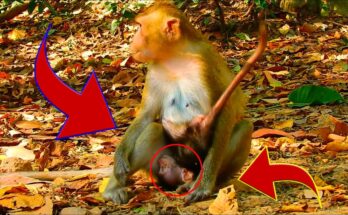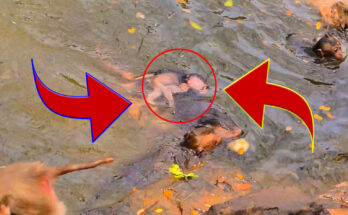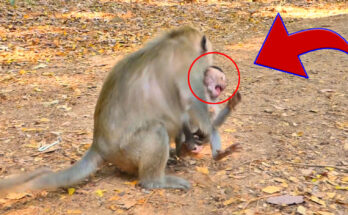In the heart of the jungle, life moves in a delicate balance, with each species playing its part in the ecosystem. Among the many fascinating creatures that inhabit the dense forests, the monkeys, especially the mothers and their babies, offer some of the most heartwarming, yet deeply emotional, stories of survival and care. Recently, an incident involving a baby monkey and its mother has captured the attention of animal enthusiasts and researchers alike, raising the question: What happened to the baby monkey? Why is the mother looking after the baby like this? Why Baby…?
To understand this, we need to take a closer look at the relationship between the baby monkey and its mother, and the specific circumstances that may have led to the unusual situation.
The Bond Between a Mother and Her Baby Monkey
Monkeys are known for their strong familial bonds, particularly between mothers and their offspring. From the moment a baby monkey is born, it is utterly dependent on its mother for survival. The first few weeks of a baby monkey’s life are crucial for its development, as it learns to cling to its mother’s fur, feeds from her milk, and stays close to her for warmth and protection. The mother, in turn, plays a critical role in teaching her young one essential survival skills, such as how to navigate the trees, find food, and communicate with other members of the group.
This bond is so intense that the mother monkey will go to great lengths to ensure her baby is well-cared for. If something threatens the baby, the mother’s protective instincts will kick in immediately. The care a mother gives is not just limited to basic needs; it extends to emotional comfort as well. Monkeys, like humans, can feel stress, anxiety, and fear. A mother monkey knows how to soothe her baby, often by grooming or holding it close, to ensure the infant feels safe.
What Happened to the Baby Monkey?
In the case of the baby monkey in question, it appears that something went wrong, possibly involving an accident or a dangerous encounter with a predator or a human. There are numerous reasons a baby monkey might end up in a fragile state that demands exceptional care from its mother. For instance, the baby could have fallen from a high branch, suffered an injury, or experienced a scare that led to trauma.
Such incidents are common in the wild, where monkeys live in complex environments, filled with dangers. Accidents, such as falling from a tree, are a natural part of a baby monkey’s growth process, as they are still learning to navigate the world around them. In these cases, the mother’s role becomes even more critical. She may not only need to comfort her baby but also provide medical care by grooming the affected area and ensuring the baby remains hydrated and fed.
Another possibility is that the baby monkey could have been separated from the rest of the troop, either due to a predator attack or a natural disaster like a storm. In such cases, the mother would find herself in a heightened state of alertness, constantly monitoring her baby and keeping it close to ensure its safety.
Why is the Mother Looking After the Baby Like This?
The mother’s behavior in this situation is a clear reflection of her intense emotional connection with her offspring. When a baby monkey is in distress or injured, the mother will do everything in her power to help it recover. This might involve constant care, including physically supporting the baby, offering emotional comfort, and even showing signs of distress or anxiety herself.
In some cases, the mother may become highly protective, refusing to allow the baby to be left alone or interact with other members of the troop. This behavior, though seeming excessive at times, is a survival strategy. The mother knows that in order for her baby to survive and thrive, it needs to remain under her close watch. Her vigilant care and nurturing can help her baby recover physically, while also providing the emotional support necessary to heal from any traumatic experiences.
Moreover, this type of behavior could also stem from the mother’s past experiences. A mother monkey that has faced the loss of a previous baby, or witnessed the difficulties of a sick or injured infant, may become even more protective in future pregnancies. It’s a natural instinct to avoid losing a child, and this intense care can be seen as a means of ensuring that nothing happens to the current baby.
Why Baby…?
The phrase “Why Baby…?” echoes the perplexity and concern that comes with witnessing such a vulnerable moment in nature. It expresses the sadness and the poignant nature of watching a young life struggle for survival in the wild. The “why” also speaks to the universal question of why innocent creatures must face such hardships. Yet, the answer lies within the very nature of the wild itself — it is a place of beauty and brutality, where survival is never guaranteed, and the bond between mother and baby is one of the most essential forces that drive life forward.
In the end, what happened to the baby monkey is a reminder of the fragility of life and the relentless love and dedication that mothers, both in the animal kingdom and human society, demonstrate to ensure the well-being of their young. Through every challenge, the mother’s commitment to her baby serves as a testament to the power of maternal love. Why Baby…? Because, in the wild, it’s not just about surviving; it’s about ensuring that the next generation has a chance to thrive.


